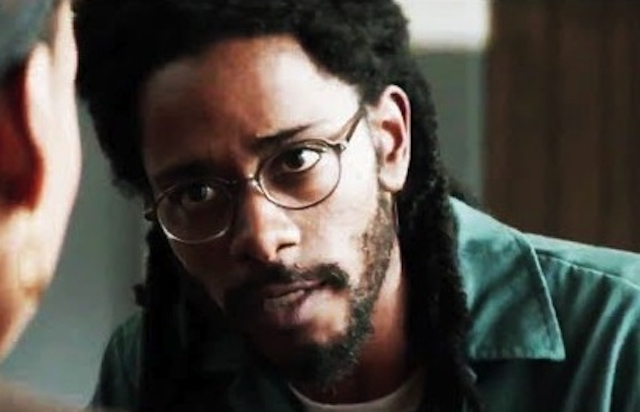CHICAGO – The Steppenwolf Theatre of Chicago continues to provide different viewpoints on the American stage, and their latest “Little Bear Ridge Road” is no exception. Featuring ensemble member Laurie Metcalf, it’s the resonate story of a family at the crossroads. For tickets/details, click LITTLE BEAR.
American Legal System is Put on Trial in ‘Crown Heights’
 Rating: 4.0/5.0 |
CHICAGO – There is no justice for the poor. That should be carved in stone on courthouses beside all the platitudes of American “equality” and “law.” In an eye-opening narrative film based on a true story, “Crown Heights” explores just how an impoverished individual can be found guilty and imprisoned unjustly for years.
Colin Warner, the prisoner of the film, is also an immigrant and a person of color, but that doesn’t play into his prosecution as much as simply being railroaded into a guilty verdict. The story is an example of the cracks in the American legal system… law enforcement who just desire to clear the dockets and call it a win, overworked public defenders, prosecuted victims who don’t understand the system and remote politicians who “promise” punishment, making new laws that just make the system more overloaded. Of the approximately 2.5 million incarcerated persons in the U.S., estimates are there are 150,000 of them who are innocent, but locked up because the system needed to move on. “Crown Heights” is a compelling example of that blatant unfairness.
Colin Warner (LaKeith Stanfield) is a petty car thief from Trinidad who is trying to go straight by learning auto mechanics. While walking on his Brooklyn streets in 1980, he is arrested without warning. He is charged with the murder of a teenager on the streets, even as he has no connection to the crime. In a complex and badly handled case, he is found guilty, and sentenced to the maximum penalty of life in prison.

LaKeith Stanfield is Prisoner Colin Warner in ‘Crown Heights’
Photo credit: Amazon Studios
His best friend, Carl ‘KC’ King (Nnamdi Asomugha) is convinced that his fellow traveler has been railroaded, and begins a process of getting him a new trial. However, the State of New York will not admit that the trial was flawed, which means finding new evidence with the help of a new attorney, William Robedee (Bill Camp). Meanwhile, 21 years tick by for Colin, a victim of the harsh flaws in the American legal system.
The writer/director Matt Ruskin does some very interesting insertions to show the passage of time. With each passing year, Presidents Reagan to Poppy Bush to Bill Clinton (and other lesser leadership offices) decry crime from their bully pulpits and promise “law and order.” The new laws are put in place – like the “three strikes” rule – handcuff the legal system further, and continue to victimize the easy scapegoats… the immigrants, the minorities and the poor.
The performance by LaKeith Stanfield as Colin is remarkable in both its anger and restraint. The prisoner is first frustrated to the breaking point, until he realizes the only person that will get him freedom is himself. He takes up studying law, and at one point even writes his own brief. Stanfield is effectively able to express all transitional sides of Colin’s character. Nnamdi Asomugha, an ex-NFL player making his acting debut, is a one-man obsessive as Carl. The way he opens doors to the case is fascinating, part in acquiring more knowledge and part as unrelenting street detective. And the great character actor Bill Camp is always welcome, and adds a bit more spice to the white knight attorney.

Nnamdi Asomugha as Carl ‘KC’ King in ‘Crown Heights’
Photo credit: Amazon Studios
The prison industrial complex in America, made worse by farming out the running of those institutions by private industries, actually is motivated to fill these pens with prisoners (or customers). So the legal system is “encouraged” to do so with more and more draconian laws, designed to perplex the undereducated and create situations where “undesirables” can easily be sent away. “Crown Heights” exposes these holes in the legal fabric, creating law but not order.
Part of the Miranda Warning, that intonation of rights that are given to each arrested person, include “if you cannot afford an attorney, one will be provided for you.” As “Crown Heights” asserts, just because the attorney is provided for you doesn’t mean they’ll work to get you justice. In an extreme situation, like poverty, in America you’re on your own.
 | By PATRICK McDONALD |


